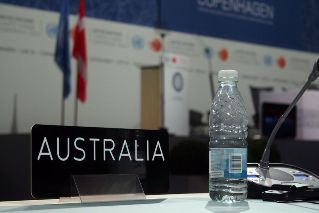 The Cancun climate talks are showing signs of making headway and repairing some of the damage that resulted from the acrimonious Copenhagen meeting last December.
The Cancun climate talks are showing signs of making headway and repairing some of the damage that resulted from the acrimonious Copenhagen meeting last December.
High-level talks involving environment ministers and world leaders are underway and are expected to prove critical.
Australia’s Climate Change Minister, Greg Combet, has warned the negotiations will be intense and there are no promises of a successful outcome.
“My ministerial colleagues and I have come from all over the world to Cancun because we believe there is a deal to be done,” he said.
“We need all parties to show flexibility to achieve an outcome here in Cancun.”
While the commentary in Cancun has painted these talks as cooperative, there is no denying there are big issues still unresolved.
These include the global fund for poorer countries, the divide that remains between developing and developed nations and the issues of verification of emissions and transparency.
However, there are signs that these talks, unlike Copenhagen, will bring some success.
Already the US has confirmed its commitment to emissions reductions and China has said it will bring its voluntary targets under the UN umbrella.
But Mr Combet says negotiations remain complex and expectations surrounding the outcome of talks should remain realistic.
“I would hesitate to predict where we’ll end up, but we are working very hard along with other countries to try and make sure there’s some successful building blocks that can ultimately lead us to a legally binding agreement,” he said.
“But we’re a way off that yet.”
Good and bad news
The United Nations environment program formally presented delegates with the results of a study it published which delivers both good and bad news.
The UN’s under-secretary-general, Achim Steiner, says if the voluntary commitments in Copenhagen were to be implemented progress could be made.
“Then we would be 60 per cent of the way to where we need to be by 2020 in addressing a climate change action program that would allow the world to still have an opportunity to stay within the two-degree range,” he said.
“The bad news is that 40 per cent are still missing.”
The UK’s secretary for energy and climate, Chris Huhne, acknowledged the report but says he is confident the mood in Cancun can deliver results.
“We are still at the beginning of the last week and obviously we hope to make further progress,” he said.
“But I’m absolutely convinced we can make real progress on this area and on a number of other really important dossiers here at Cancun and that’s an achievable potential outcome of our deliberations this week.”
Energised
This is Mr Combet’s first UN climate meeting, and no matter how it ends he is energised about what he wants to do when he returns to Australia.
“There’s a misapprehension, I think, in Australia that somehow we’re the only country out there trying to do things, and of course that is not the case,” he said.
Mr Combet pointed to an emissions trading scheme in place across Europe, adding that various states in the US and Canada have also committed to emissions trading arrangements.
“At a national level, the US administration talks about potentiality for regulation to deal with emissions,” he said.
“Activity is going on in China, we know, and nothing that I’m learning here is persuading me of any other view than that we have to get on when I’m back in Australia with developing our own carbon pricing approach.”
He says the Greens and Tony Abbott will have to deal with his determination.




